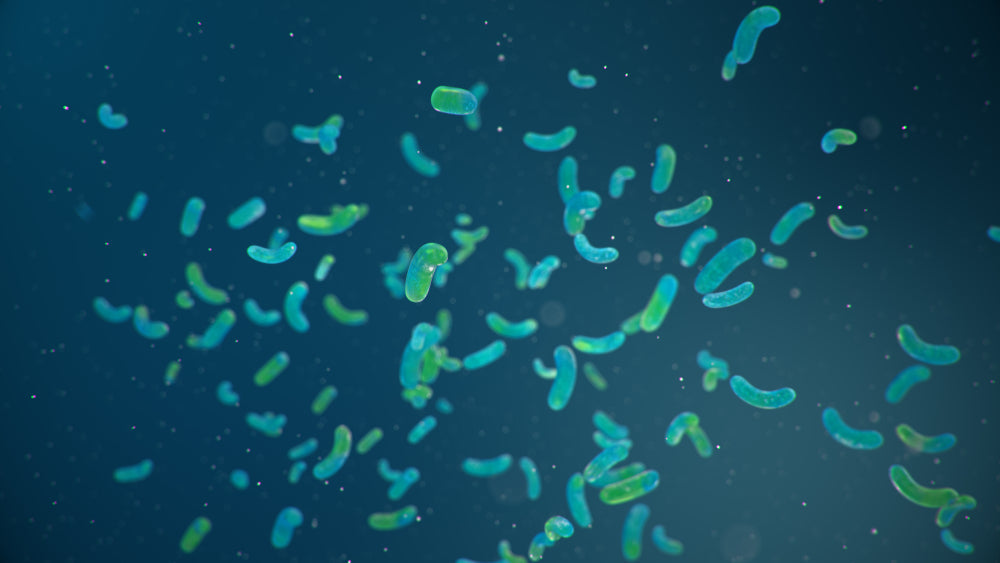What Are Prebiotics? The Key to Gut Nourishment
4 min readShare

What Exactly Are Prebiotics?
Imagine sending in a team of helpful gut bacteria but forgetting to pack them lunch. That’s what happens when you skip prebiotics. These non-digestible fibres pass through your upper gastrointestinal tract untouched, arriving in the colon where they serve as food for the beneficial microbes living there¹. As your gut bacteria feast and ferment, they produce short-chain fatty acids—like butyrate—that reduce inflammation, nourish the intestinal lining, and even influence your brain via the gut–brain axis².
Prebiotics vs Probiotics: Why You Need Both
Probiotics often get the spotlight, but without prebiotics, they’re like houseguests without a fridge full of food. That’s why the most powerful gut health approach isn’t probiotics alone, but a combination of prebiotics, probiotics, and postbiotics—what we call Tribiotics. This comprehensive method not only seeds the gut with healthy bacteria but also nourishes and protects them, ensuring they work synergistically for maximum effect. Prebiotics are essential to this trio, supporting probiotic viability and enhancing the impact of postbiotics in restoring balance and resilience to your microbiome.

Common Signs You’re Lacking Prebiotics
If you’ve ever wondered why you’re still bloated, constipated, or sluggish despite your clean eating and regular probiotic intake, prebiotic deficiency could be to blame. These fibres are mostly found in whole plant foods—yet the average Australian consumes less than half the daily recommended intake of dietary fibre³. Without prebiotics, your gut bacteria go hungry, leading to microbial imbalance and inefficient digestion.
Sources of Prebiotics
You don’t need exotic ingredients to support your gut. Nature already provides a bounty of prebiotic-rich foods that can nourish your microbiome daily.
These include:
- Garlic: Rich in inulin, it encourages the growth of Bifidobacteria while supporting immune health.
- Leeks: From the same family as garlic, leeks contain inulin and flavonoids, benefiting both gut and heart health.
- Asparagus: A seasonal favourite, asparagus contributes to microbial diversity through fermentable fibres.
- Green bananas: High in resistant starch, they offer fuel for beneficial bacteria and help smooth digestion.
- Oats: Packed with beta-glucan and resistant starch, oats promote satiety while feeding gut flora.
- Chicory root: One of the richest natural sources of inulin, often used in functional gut health supplements.
For those needing additional support, clinically researched prebiotics like Livaux®, a gold kiwifruit extract, have shown the ability to promote species like Faecalibacterium prausnitzii, known for their role in calming inflammation and maintaining gut lining integrity⁴. While whole foods form the base, adding targeted prebiotics may be beneficial for those with specific digestive needs.

Conclusion
Prebiotics are the unsung heroes of gut health, quietly powerful, often overlooked, but absolutely essential. As we’ve explored, they’re more than just fibre. They’re foundational fuel for your gut microbiome, supporting everything from digestion and inflammation control to mental clarity and immune resilience. Unlike probiotics, which often struggle to survive the digestive gauntlet, prebiotics consistently reach the colon where they feed and fortify your body’s beneficial bacteria.
If your wellness efforts haven’t delivered the relief or energy you expected, it could be time to look deeper, starting with what you’re feeding your gut.
Reference
- Gibson GR, et al. Dietary modulation of the human colonic microbiota: updating the concept of prebiotics. Nutr Res Rev. 2004.
- Silva YP, et al. Short-chain fatty acids and gut microbiota: Significance in health and disease. Biomedicine & Pharmacotherapy. 2020.
- Australian Bureau of Statistics. National Nutrition and Physical Activity Survey 2011–12.
- Drummond RA, et al. Effects of gold kiwifruit extract (Livaux®) on human gut microbiota. Nutrients. 2020.
